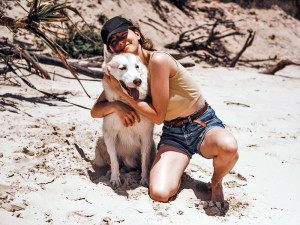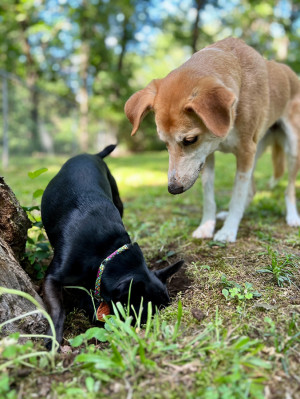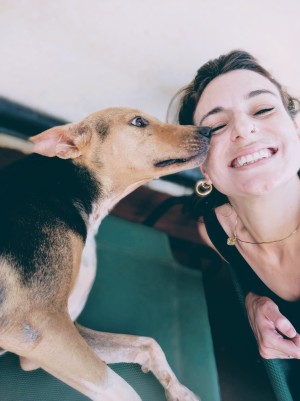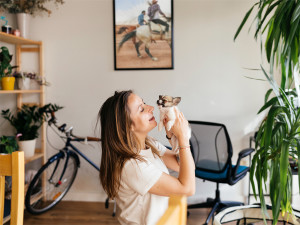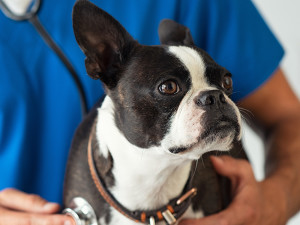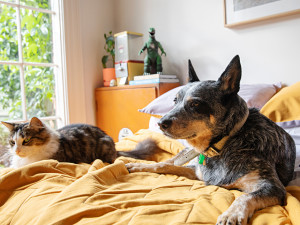How Much Does it Cost to Have a Dog?
We got our paws on a calculator and did the research so you don’t have to
Welcoming a new dog into your life is an incredibly exciting time, whether it’s your very first pup or a new addition to your clan. Making that decision is the best feeling, and it can be easy to get caught up in ordering all the fun stuff such as beds, bowls and that fancy new harness you’ve had your eye on.
However, without being a Debbie Downer, it’s super important to (we hate to say it) budget. You’ll no doubt have noticed that the price of just about everything has rocketed since the start of the UK’s cost of living crisis at the tail end of 2021 and this has extended to pet products and veterinary care. When you commit to a new four-legged family member, that’s a commitment for life – planning ahead might sound boring, but it will ensure you have the resources to provide the quality of life your new floof deserves. Considering the average lifespan of a companion dogopens in new tab in the UK is 12.5 years, we reckon that’s pretty important.
Dogs Trust’s 2023 National Dog Surveyopens in new tab received nearly 250,000 responses and its results speak volumes about how rising costs are affecting dog parents. Of those who said they were considering getting another dog, 60 percent admitted that the cost of living crisis had impacted this decision. The majority of pet parents said they were most worried about the cost of vet bills, followed by pet insurance, dog food and dog-minding fees.
Sadly, this has led to some pet parents having to make incredibly difficult decisions. An RSPCA spokesperson tells us, “Between 2021 and 2022, the RSPCA saw a six percent increase in the number of dogs taken into care. In 2023, we received reports of more than 16,000 abandoned dogs and saw a three-year high in incidents of animals being abandoned – a problem that is being fuelled, we fear, by the cost of living crisis.”
While we’re absolutely not trying to put you off getting a new four-legged pal (we’re as dog obsessed as you, duh!), we do want to help you make a more informed decision when it comes to how much money you’re likely to need.
Let’s start with the most important purchase of all…
How much does it cost to get a dog?
First things first – you need to find your dream dog. Looking to adopt? That’s great news! Costs of adopting from a shelter vary and tend to be more expensive if you’re choosing a puppy. To give you an idea, the cost of an adult dog at Battersea is £175opens in new tab and £250 at Dogs Trustopens in new tab. Prices at Blue Cross start at £500 for a puppyopens in new tab, decreasing incrementally to £200 for a dog that’s eight years or older. These fees generally include a full health check, initial vaccinations, neutering, microchipping, a collar and a lead.
Adopting a dog from overseas has hugely increased in popularity in recent years, though this is likely to be a more expensive option than getting a rescue from the UK as there are additional costs involved. As an example, an adult dog from Paws2Rescueopens in new tab in Romania costs £475, which includes all required blood tests, health checks, vaccines, neutering (where appropriate), microchipping, pet passport/health book, transportation and import fees. Thailand’s Soi Dog opens in new tab doesn’t charge for adoption, though you have to pay for the flights and customs fees, which can be pricey. It’s important to speak to your chosen organisation to understand what is and isn’t included in your fee, so that you’re aware of any additional costs that may be incurred once your precious pooch arrives.
Wanting a specific pedigree puppy from a breeder? This is going to be a more costly option compared to adoption. Research conducted by loan intermediary Samblaopens in new tab shows that average prices range from £800 for a Bedlington Terrier to £3,500 for an Italian Greyhound. Of course, if going down the breeder route, it’s imperative that you find a reputable one; discovering you’ve purchased a sickly puppy from a rogue breeder may well cause you heartache and financial stress in the future.
Worryingly, research for The Kennel Club’s 2023 Be Puppywise campaignopens in new tab shows that 50 percent more people are purchasing pups via social media than they were five years ago, with one in four of these animals getting sick or dying before their first birthday. As a result, this has led to 60 percent of these pet parents facing unexpectedly high financial costs.
“Finding a responsible breeder is all about doing your research and knowing what to look for,” explains Bill Lambert, spokesperson for The Kennel Clubopens in new tab. “When looking for a reputable breeder, a good place to start is asking friends, family, breed clubs, training clubs or your local vet to see if they have any recommendations.
“A good breeder will be able to answer your questions thoroughly and informatively, and you should expect to be asked lots of questions too – it shows they care that their puppy is going to a good home. Responsible breeders will also perform relevant health testing and screening before breeding to increase the chances of producing healthy, happy puppies. Prospective pet parents can find breeders who make use of the health tests available to them on The Kennel Club websiteopens in new tab.
“Would-be parents should always see the puppy with its mum, in their home environment and more than once, and ensure they are provided with paperwork, including relevant health test results for the puppy’s parents, a contract of sale, information about vaccinations and microchip details. Importantly, be prepared to be put on a waiting list – remember that a healthy, happy puppy is worth waiting for.”
How much will the vet cost for my dog?
Bringing a new puppy home? Here’s what you need to know. “With a new dog I personally would recommend a check-up with a vet even if they’re not a puppy,” advises vet Lucy Bainbridge. “Once they’ve settled it and got to know the new parent it can be good to chat about how they’re getting on, make sure they’re up to date with vaccines and flea/wormers, and give them a full clinic exam to check there are no underlying issues that the new parent isn’t aware of. This is especially important in older rescue dogs.”
So, what vaccines and preventatives do dogs need? “Your puppy will need its first vaccines at 8–10 weeks old; core vaccines in the UK are distemper, hepatitis, leptospirosis and parvovirus,” explains vet nurse, Pia Dodd. “You’ll then need to keep them inside before going back to the vet 2–4 weeks later for a second vaccine. After that, it’s an annual booster. All dogs need to be up-to-date on flea, tick and worm preventatives, and puppies need worming every month until six months old to protect against lungworm. Plus, if you plan to board your dog in kennels, they’ll need a kennel cough vaccine.”
Vet fees aren’t standardised in the UK, so costs can vary hugely depending on where you live and who owns the veterinary practice. Recent data from VetHelpDirectopens in new tab shows the average consultation fee in Dumfries and Galloway is only £32.50, rising to as much as £85 in London.
In fact, the cost of taking your pet to the vet has increased so much in the UK that the Competitions and Market Authority (CMA) is planning to l aunch a formal investigation into the matteropens in new tab. This is definitely something to take into account when deciding to welcome a dog into your home – will you be able to afford treatment for any medical issues that may arise, especially if fees continue to rise?
It’s a problem that’s affecting current pet parents. “We have unfortunately noticed marked differences since the cost of living crisis,” says vet nurse Martha Davis. “For example, a lot of people will try to put off bringing pets in when they start having problems (eg, bad ears or skin issues) and wait until a general health check appointment to avoid paying two separate consultations. However, in doing this it causes the conditions to worsen, meaning a more aggressive treatment route is then needed, as well as pets being left in pain and uncomfortable for a longer period.
“It’s quite common for owners to decline treatments for chronic medical conditions due to not being able to afford it or to decide on euthanasia, which is heartbreaking for both owners and veterinary staff.”
Pet insurance can help you financially prepare for the worst, and, like car insurance, there are different levels of cover. According to Money to the Massesopens in new tab, the most comprehensive (and expensive) is lifetime insurance, which covers your dog for the duration of its life, including any chronic conditions. There’s an annual limit per condition, which resets each year. Then you have maximum benefit insurance, which covers your dog for a certain amount per condition – this doesn’t reset each year, but there’s no time limit for claiming so long as your policy is still active. This level is best for covering accidents and short-term illnesses. Time-limited insurance is similar to maximum benefit, except you’ll no longer be covered for that specific illness/injury once you’ve reached either the monetary or time limit (usually 12 months), whichever is sooner. Accident-only pet insurance is usually the cheapest and, as its name suggests, only covers your dog for sudden, unexpected injuries, and doesn’t cover illness.
The price of your policy will be affected by the chosen level of cover and where you live, as well as your dog’s breed, age and medical history. Pedigree dogs are more prone to hereditary conditions, so these tend to be more expensive to insure. Research from GoCompareopens in new tab also reveals that larger dogs have higher premiums, as well as dogs based in locations with higher living costs. For example, the average annual pet insurance premium costs £419 in London, reducing to £339 in the North East.
To help you plan your finances, we’ve made a list of all the things you’ll have to pay out for, healthwise. Be aware that a vet consultation fee doesn’t include any treatment or medication that’s required after diagnosis. It’s hard to give an estimate for this, but major surgery can go into the £1000s, and your insurance policy may not cover that entire cost.
Regular consultation: £32.50-£85
Emergency consultation (out of hours): ~£250
Spay/neuter: £110-£365
Microchipping: £10-£30
Flea/tick preventatives (monthly cost): £5-£10.50
Wormer (every three months): £1.60-£16+
Primary puppy vaccines (one-off)*: £56-£152
Booster vaccines (annual)*: £42-£118
Kennel cough vaccine (annual)*: £21-£69
Vaccine information taken from a survey of veterinary clinics in England, Scotland and Wales, conducted by ManyPetsopens in new tab.
How much do dog supplies cost?
The sky’s the limit when it comes to pet supplies – shopping for your dog is the second most fun part of owning one (after booping their snoot, of course). However, costs can soon add up if you’re a magpie when it comes to designer collars, luxury dog beds and Pinterest-worthy food bowls. If your finances aren’t unlimited, it’s wise to make a list of what’s worth splurging on and what’s best to save on.
To give you an idea, we’ve detailed approximate costs below, which we came to via a very scientific method of sniffing around for both budget and luxury options. Food costs are very much dependent on the size and breed of your dog and whether you’re opting for basic kibble (dry food) or a fresh food subscription service.
Food (per month): £10-£160+
Treats (per small pack): £1-£4
Puppy training pads (per pack of 100): £13-£23
Poo bags (pack of 100): £1.50-£6
Dog shampoo: £4-£20
Stain/odour remover: £5-£10
Collar: £3-£50
Lead: £1.50 -£50
Harness: £5-£80
Bed: £10-£160
Food and water bowls (per bowl): £1-£73
Toy: £1-£20
GPS dog tracker (not including subscription): £43-£149
How much do dog groomers and walkers cost?
Not every dog parent will need a groomer, dog walker or trainer, but you’re likely to require services from the below list at some point in your dog’s life, so it’s important to factor these costs in. Do you have a mate who can look after your dog when you go away or will you need to use kennels? Do you work from home or will you require help with daycare or walking? You might not plan to use a trainer, but let’s be real – you never quite know what you’re bringing home. Any pup has the possibility of turning into a little terror, so it’s best to have some money stashed away in case you need to dial up a behaviourist in the future.
It’s important to note that pricing for grooming and kennels usually depends on the size/breed of your dog, and you can expect to pay a higher price for all the below services if you live in London.
Grooming (full groom, per visit): £22-£150+
Dog walker (per walk): £7-£20
Doggy daycare (per day, not including pick-up/drop-off): £26-£55
Boarding kennel (per 24 hours): £16-£67
Training (per one hour one-to-one session): £30-£100+
Training (per one hour group class): £10-£35+
Phew, that’s a lot of info, huh? Look, we get it – as Brits, it’s not in our nature to talk about money, but we reckon it’s pretty important when it comes to keeping your pooch happy and healthy. So, go forth and crunch those numbers!



